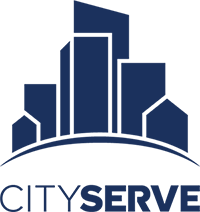As we approach the first anniversary of the original stay-at-home order, the emerging story is one that the church has known all along; that more profound than our human differences are God-given commonalities, like the need for food, water, shelter – and hope. COVID-19 has lingered long past what most imagined, and with the shutdown of local businesses devastating communities nationwide, the number of people seeking food assistance has increased by 55% in less than a year.
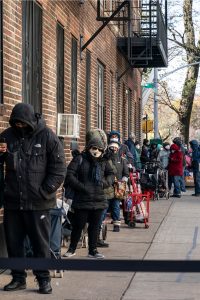 CityServe’s partnership with the USDA Farmers to Families Food Box program has impacted the “Last Mile of Need” – a metaphorical term that has typically been defined by those who have unmet food needs, lack transportation, have physical limitations, or have fallen between the cracks of a stressed system. CityServe has reached this group by empowering churches to serve their communities with food and a healthy dose of hope. Yet newly apparent is how food insecurity has stricken households that have never experienced it. Families that have always had the financial means to purchase food are now struggling to fulfill basic needs.
CityServe’s partnership with the USDA Farmers to Families Food Box program has impacted the “Last Mile of Need” – a metaphorical term that has typically been defined by those who have unmet food needs, lack transportation, have physical limitations, or have fallen between the cracks of a stressed system. CityServe has reached this group by empowering churches to serve their communities with food and a healthy dose of hope. Yet newly apparent is how food insecurity has stricken households that have never experienced it. Families that have always had the financial means to purchase food are now struggling to fulfill basic needs.
CityServe has reached this group by empowering churches to serve their communities with food and a healthy dose of hope.
The Broadening Impact of Covid-19: The Newly Hungry
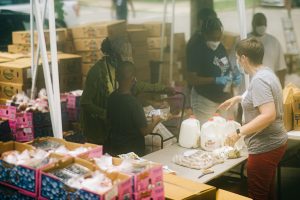
Farmers to Families food box distribution at DC Dream Center
Before the pandemic, Rosemary Evans, a member of the Seventh Day Adventist Church of Bessemer for over 30 years, focused on helping families unable to afford healthcare. As the leader of the congregation’s Health & Temperance ministry, Rosemary planned events such as health fairs and glucose screenings. But these days, the essentials have shifted. As Rosemary says, “Now getting food has become most important. It’s a need for basic survival.”
This shift in the type of need, however, isn’t all that’s changed. In places like Mobile, Alabama, churches are also seeing a growing number of people who have never needed governmental food assistance cue up in their food distribution lines. Travis Johnson, Lead Pastor of Pathway Church, shared how those who have and those who don’t, have come to meet somewhere in the middle – namely his church parking lot. “This season is different,” observed Johnson. “I have seen people in beautiful SUV’s — gorgeous cars — get in that line and I know they’ve never been in a line like that before. They’re in that line and it’s public — people can see them. Even someone’s previous year’s income, that sort of thing, does not reflect their present reality.”
Indeed, our present reality is different than it was even at the outset of the pandemic. Feeding America reports that roughly 4 in 10 people currently utilizing food banks have never done so in the past.
The challenge that America is facing in terms of providing nutritious food for those suffering from joblessness or even those who are back to work but have had difficulty since the early days of mandatory closures, has been astronomical. This sharp increase of people in need has left more and more families with a dilemma on whether to pay their rent or buy groceries.
This sharp increase of people in need has left more and more families with a dilemma on whether to pay their rent or buy groceries.
Participating in Hunger Relief, No Matter the Size
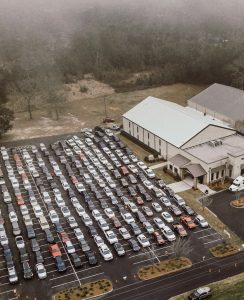
Truck to Trunk line at Pathway Church
Churches are helping to bridge the gap in the food supply chain through the CityServe distribution model. Pathway Church, with its 3000 members, functions as a center of distribution, or HUB, for the program and helps make dissemination to the local community happen seamlessly. Pastor Johnson reflects on the process of moving 1300 thirty-pound food boxes from truck to trunk like fine choreography. “We start at 9 am and we’re done by 9:30 or 9:45 with whatever is on the truck. We line cars up in about four lines, release an entire row (four to five cars deep) and we have the pallets stacked in between rows – one volunteer per car. Each car gets a box and a brochure of our services. Then they can opt into a fifth line which is a prayer line.”
The size and precision of this HUB allows for a large-scale impact in the community. But big impact can be felt no matter the size of the church. At only 200 members, Evans’ congregation is reaching out to neighbors in Bessemer and creating connections through personal delivery of food boxes. Recently, Evans and a friend showed up in person to ten different households in desperate need of food. The recipients included a single mom, a woman recovering from surgery, and several seniors. She recalls that some were so hungry that they opened the box right on their porch and started eating.
She recalls that some were so hungry that they opened the box right on their porch and started eating.
More Than Food: Offering Hope and Compassion
In the book of Acts, the church was said to have not claimed any possessions of their own but to share everything they had (Acts 4:32). With the CityServe distribution model in place, the church network of today is fulfilling that call, offering all they have to one another with compassion. Though neighbors might show up to a church parking lot for a food box, they are also receiving an offer of prayer and hope beyond the box.
Though neighbors might show up to a church parking lot for a food box, they are also receiving an offer of prayer and hope beyond the box.
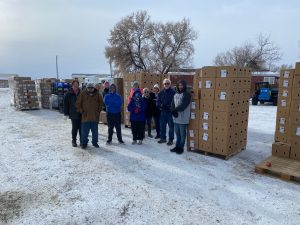
Living Hope Fellowship distributed food boxes in snow storm
Currently, CityServe has spearheaded a faith-based collaboration that has delivered over 13 million food boxes across the nation through churches and faith-based organizations. There are real costs associated with delivering food boxes in the “Last Mile of need.” You can help make an impact at any level by giving a gift at https://uncommongiving.com/np/last-mile-of-need.
To find out how you can get involved as a church, corporation, community, or as an individual, visit us online at www.CityServe.us to deliver critical items to those in need and help offer hope to those struggling through the on-going pandemic.
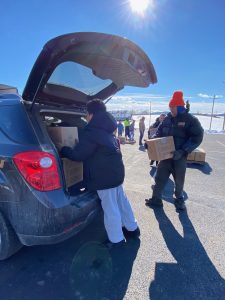
(Additional information on the Farmers to Families Food Box Program, including webinars and FAQs, is available at https://www.ams.usda.gov/selling-food-to-usda/farmers-to-families-food-box)
